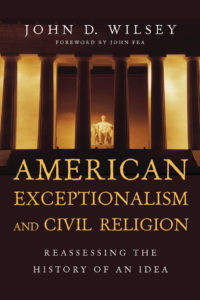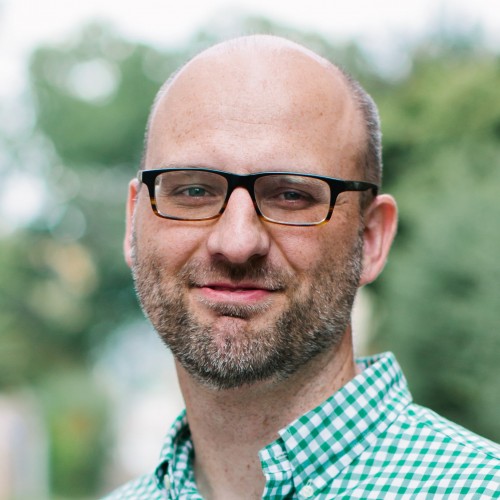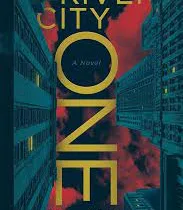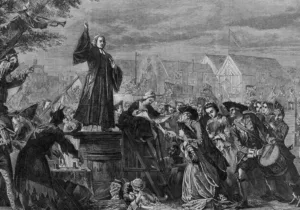This book review of John D. Wilsey’s American Exceptionalism and Civil Religion: Reassessing the History of an Idea first appeared in the Spring 2017 issue of Providence’s print edition. To read the original in a PDF format, click here. To receive complete copies of future issues before they appear online, be sure to subscribe for only $28 a year.
If you haven’t noticed, America is in the middle of an identity crisis. It’s getting harder and harder to agree upon an “unum” in the e pluribus unum. What exactly makes America one? Ask those wearing red “Make America Great Again” ball caps and those holding “Black Lives Matter” picket signs, and you’ll hear pretty different answers.
The culture wars have been with us for decades. But those rivalries seem to have deepened and complexified of late. The late Anthony Scalia, in a 2013 interview with New York, waxed wistful about Katherine Graham’s DC dinner parties in the 1970s and 80s where Republican and Democrat powerbrokers fraternized and clinked glasses. But this “doesn’t happen anymore,” Scalia said. “It’s a nasty time. It’s a nasty time.”
Indeed, think of what has transpired even since 2013: Obergefell and the non-stop showdown between erotic and religious liberty, the explosion of police-brutality—real and imagined—videos and the emergence of Black Lives Matter, the sudden prominence of the transgender movement, the rise of the alt-right, the growing divide between globalists and nationalists, the still-bewildering 2016 elections, and the nativist resurgence which Donald Trump represents.
Perhaps every generation feels like its moral and political battles amount to “an extinction-level event,” to borrow Andrew Sullivan’s mid-2016 description of the Trump candidacy. Human beings often view their own life and times in alternatively exalted and draconian terms. Yet underneath all these newspaper headlines is a real battle over what or who America is.

A “nation” might be defined as a group of people whose sense of being a “we” is strong enough to create a belief in their moral right to self-government, whether or not they have the capacity to establish such a government. This sense of “we” might root in a land, a family lineage, or a religion or creed, suggests British philosopher Roger Scruton. For Americans it’s a creed. We may sing “This Land Is Your Land” with Woody Gutherie, but generally speaking Americans identify themselves by a set of ideas involving natural rights, individual freedom, and equality. These shared values comprise America’s civil religion, says John Wilsey in his prescient 2015 book American Exceptionalism and Civil Religion: Reassessing the History of an Idea. They comprise the DNA inside of “we the people.” And they make us feel “exceptional.”
The phrase “civil religion” should not be confused with traditional religion, says Wilsey. It refers to the set of practices, symbols, and beliefs around which a citizenry unite (20). For Americans, George Washington is our Moses-figure, Abraham Lincoln our premier theologian, the Declaration of Independence and Constitution our Old Testament, the Gettysburg Address and Lincoln’s Second Inaugural our New—which fulfills and interprets the Old. Memorial Day, Veterans Day, Presidents Day, and, more recently, Martin Luther King Jr. Day compose part of our liturgical calendar.
The phrase “American exceptionalism” goes back to that early American observer Alexis de Tocqueville. Yet the word “exceptional,” Wilsey observes, can mean either “different” or “special.” Barack Obama employed the first sense when he affirmed American exceptionalism, “just as I expect the Brits believe in British exceptionalism and the Greeks believe in Greek exceptionalism.” More often, however, Americans have used the phrase to mean special, which shades into better, transcendent, normative, tasked with a divine mission in the world.
Wilsey traces these two concepts of exceptionalism through this book, referring to them as open exceptionalism and closed exceptionalism, respectively. His basic argument is that closed exceptionalism “is at odds with the Christian gospel,” while open exceptionalism “can serve as a beacon pointing to justice, natural rights and the ethical well-being of the nation and the world” (18, 19).
Closed exceptionalism takes five biblical concepts meant for God’s chosen people in Scripture—(1) chosen nation, (2) divine commission, (3) innocence, (4) sacred land, and (5) glory—and applies them to America. Think of John Winthrop’s admonishing the Massachusetts Bay colonists in 1630 to be a “city on a hill,” borrowing words from Matthew 5:14 that Jesus intended for his followers. The phrase would eventually be picked up by everyone from John F. Kennedy to Ronald Reagan. The danger of treating the nation like God’s chosen people, aside from perverting the real gospel and misusing Scripture, is that it creates a people who sanctify all their transgressions and prejudices under the holy cloak of a divine mission or “manifest destiny.” The nation becomes an idol, and just like every idol in the Old Testament, it requires sacrifices, whether that’s the bodies of Native Americans or African Americans. Closed exceptionalism, effectively, is White. It poses as Christian. It’s exclusivist. It cannot admit error. It is self-satisfied and sectarian.
Open exceptionalism, on the other hand, refuses to confuse itself with revealed religion, but confines itself to affirming universal values in the so-called political and cultural domain: the rights to life, liberty, property, religious freedom, equality, rule of law, individual dignity, and justice (26). It is not Christian, per se, but what Wilsey calls “an amalgamation” of Christianity and Enlightenment principles (51). It is inclusivistic. It opens freedom to all. It is never self-satisfied but always aspires to the principles of natural law. It is willing to chasten the “sectarian tendencies of the Christian tradition (or any religion, for that matter), to prevent the curtailment of religious freedom” (35).
It’s highly tempting to walk through every chapter of the book. Each fascinates. I won’t, but I will simply note that Wilsey covers a vast range of topics from the millennial, covenantal, and typological readings of political history by New England Puritans; to Benjamin Franklin and John Adam’s identification of America’s storyline with Israel’s; to the assumptions of divine chosenness inhering in Andrew Jackson’s destruction of Native Americans or in White territorial demands along the Mexican border; to comparisons between John O’Sullivan’s “manifest destiny” and Lincoln’s epistemic humility; to the foreign policy of John Foster Dulles and its legacy in the wars of today; to Ronald Reagan’s rhetoric of national innocence; to conceptions of the sanctity of the land as illustrated in the paintings of Thomas Cole; to a much-needed analysis of three popular homeschooling curriculums.
Abraham Lincoln and W. E. B. Dubois are the heroes in Wilsey’s tale of two exceptionalisms. They don’t mistake their political ambitions for God’s. Meanwhile, Wilsey draws other American heroes from individual Founders to Ronald Reagan with feet of clay, participants in a story of messianic pretentions that, amidst the good, also did bad. Jonathan Edwards, for instance, presented the colonies as a turning point in history such that, in Edwards’ words, “the new and most glorious state of God’s church on earth might commence there” (56). Thomas Jefferson, in his second inaugural, likened the nation to “Israel of old” planted in the land by the divine Being (98). These kinds of millennial and typological assumptions enabled Americans to rationalize their high-handed exploitations and discriminations.
Wilsey’s book is not a wholesale condemnation of “White Christian America,” like one or two other diatribes I’ve recently read. Yet he certainly challenges White American Christians on their tendency to mix nationalism and Christianity. Such mingling “hijacks” Christian theology and (at worst) builds the faith on racial hubris (80, 226). Wilsey doesn’t quite accuse American Christians with harlotry, like the Old Testament prophets did for combining worship of Yahweh with worship of Baal. Yet it’s effectively the same indictment—idolatry—albeit in an urbane academic vernacular.
As someone who regularly writes for pastors, I’d summarize the book’s lesson in a pastoral vernacular like this: Wilsey exposes the major role that a civil prosperity gospel has played in American history from the moment of the nation’s conception. It’s like our national DNA is laced through with soteriological, millennial, and even perfectionist assumptions. What do prosperity preachers do, after all? They hijack the promises of wealth and land that God uniquely gave to Israel in order to manufacture their own brand of legalism. In a similar way, our Christian political rhetoric in this country—more than you’ll hear from the saints in other nations—often promises that God will give or withhold his blessings to the nation according to the nation’s obedience. These Deuteronomic notes resound in everything from the jeremiads of colonial preachers[i] to the harangues of today’s religious right or social justice left.
All this to say, the pastor in me strongly recommends this book, especially to pastors, Sunday School teachers, Christian school teachers, homeschooling parents, and more. And lest there be any misunderstanding, Wilsey is no America-basher. He would be the first to say that American Christians should thank God for the many and unique gifts he has given to America. To deny acknowledging God’s blessings would be to rob God of praise. Yet like the Old Testament prophets and like Paul (see Rom. 9:1), we love our nations more, not less, by being willing to admit and address where they have gone astray. One of the first signs of a self-deceived and idolatrous nationalism is an unwillingness to hear critique, as if our nation was uniquely exempt from the nationalistic rage of Psalm 2 against the Lord and his Anointed. We should instead follow the example of Lincoln, who fretted, “I know that the Lord is always on the side of the right. But it is my constant anxiety and prayer that I and the nation should be on the Lord’s side” (87).
With these praises of Wilsey’s book firmly in place, let me now turn a corner and speak as a political theologian. I’m both sympathetic with Wilsey’s project as well as uncertain of it. I wholly agree with his critique of closed exceptionalism, but I wonder about the high degree of confidence he maintains in the American Experiment. I would say that this experiment is up for grabs at this moment in American history, which is why we have difficulty agreeing upon the unum in e pluribus unum.
The American Experiment is the historical hypothesis that people of different faiths or no faith can unite around certain universal principles (like rights, freedom, and equality). Christians today remain slow to recognize it, but the Experiment is fundamentally an Enlightenment project, not merely an “amalgamation” or “consilience” or “gentleman’s agreement” between the Enlightenment and Christianity, as Wilsey and so many other historians have argued. It’s historically true that Baptist preachers like Isaac Backus entered this “agreement” shaking hands with Enlightenment men like Thomas Jefferson, one holding firmly to the Bible and the other to some form of natural law. Yet read the contract carefully. It objectively grounds governing authority in their act of agreement (“deriving their just powers from the consent of the governed”), in spite of whatever subjective religious beliefs inspire every party’s entering into the agreement. After all, people’s respective appeals to one God, twenty gods, or no god make no difference, as Jefferson famously put it. From the get-go, then, the idea that is “America” made plenty of space for believers and paralleled the beliefs of believers; but it was built upon a contract for believers and unbelievers alike, meaning belief did not formally belong to the contract. Like Enlightenment philosophy generally, that contract remains suspended in midair with no ultimate foundations, making it subject to the whims of the times. Indeed, this is precisely why Founders like Washington and Adams pointed out that their system of government would work among a virtuous people, but be a disaster among an unvirtuous people.
Consider, then, what happens if “we the people” no longer agree upon which universals bind us together? Or rather, what if we continue to use words like “rights,” “freedom,” and “equality,” but mean very different things by them? Would Wilsey grant the right to an abortion? The freedom to define one’s own gender? Or marriage equality? I suspect not.
Or consider this supposedly universal ideal: religious freedom. Early American documents grounded religious freedom in the freedom of conscience and not in a religious argument. That way religious freedom remained non-sectarian and publicly accessible. Yet what happens when people’s consciences disagree? Planned Parenthood v. Casey said that “men and women of good conscience can disagree” on abortion. Wouldn’t it seem, then, that we should protect abortion as a religious freedom? Pro-choicers surely fight for their cause with religious zeal. Why? Because sexual freedom is religious freedom in a pagan culture. It’s an altar of worship, just as it was in the ancient world. American Christians overlook this.
Wilsey, relying on the assumptions of philosophical liberalism, attempts to separate traditional and civil religion. The problem is that our traditional religions will necessarily inform our civil religion. The two cannot be separated. I cannot enter the public square on the basis of my civil religion but not my actual religion. No one—not the Christian, not the secular progressivist—sets aside his God or gods when entering the public square. It’s impossible to do so. We only think we have set them aside because our gods (by God’s common grace) so often agree. But raise an issue where our gods disagree, and you will quickly discover that those gods have never left our side. Somebody’s god must win the decision. And so the culture war—or really, religious war—erupts. As I’ve argued elsewhere, the public square is nothing more or less than a battleground of gods.
Wilsey’s book treats the cancer of closed exceptionalism with the medicine of open exceptionalism. And he does this by doubling down on these gifts: rights, freedom, and equality. Those indeed are good gifts, but what happens when a nation begins to worship those gifts? When rights, freedom, and equality themselves become the idols? I know that’s not the purpose of his book, but when I’m standing in the temple of expressive individualism, surrounded by worshipers of the self, I cannot help but wonder about offering a medicine that has become its own kind of cancer. In fact, could it be that the idolatry of rights, freedom, and equality are the very things that send an open exceptionalism careening toward old and new forms of closed exceptionalism?
Again, please don’t misunderstand: my understanding of the New Covenant destroys any concept of a theocracy. I have very Christian and Baptist (sectarian!) reasons to affirm religious freedom and the separation of church and state—those American ideals. Still, we find ourselves in this strange moment of American history where the American arguments for religious freedom just might be destroying religious freedom, and the American arguments for rights and equality just might be destroying rights and equality. Again, I refer you to the warnings of Washington and Adams about an unvirtuous people.
Bottom line: American Exceptionalism is a genuinely excellent book. I strongly encourage pastors and teachers of every kind to read it for the sake of the cancer he does treat. You need his historical analysis. My political theologian’s caveat is that our national problems may be deeper and more profound—more exceptional—than he realizes.
—
Jonathan Leeman is the author of Political Church: The Local Assembly as Embassy of Christ’s Rule and the editorial director at 9Marks, an organization that produces church leadership resources in Washington, D.C. He is an elder at Capitol Hill Baptist Church.
Photo Credit: By Beau Considine, via Flickr.
[i] See “The American Jeremiad,” at 9marks.org.







 Sponsor a student for Christianity & National Security 2024
Sponsor a student for Christianity & National Security 2024